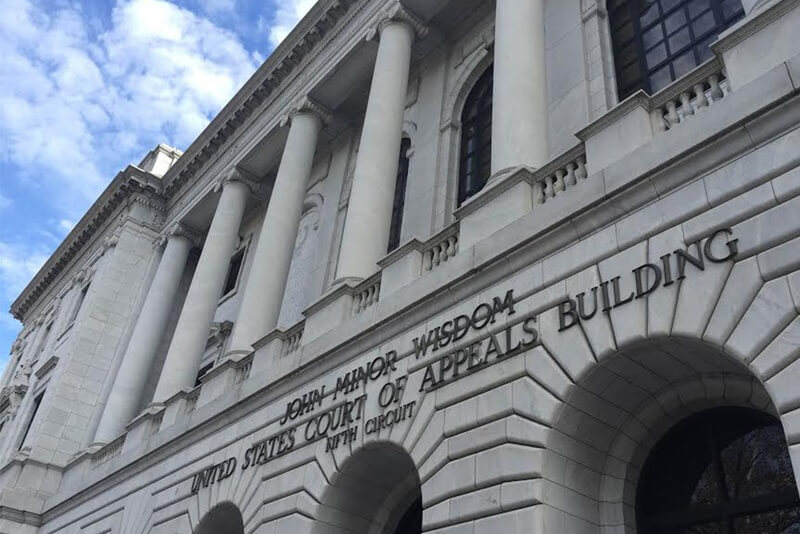Below are some case summaries from recent 5th Circuit (Federal) opinions. Enjoy.
United States v. Abdo, 2013 U.S. App. LEXIS 17251 (5th Cir. Tex. Aug. 19, 2013)
After receiving information from employees at a gun store and an army/navy surplus store, police officers believed Appellant planned to detonate a bomb and shoot service members stationed at Fort Hood, Texas. When the officers encountered Appellant they drew their firearms, separated Appellant from the backpack he was carrying, handcuffed him and then placed him in the back of a police car. Appellant admitted to the officers that he planned to attack soldiers at Fort Hood. Appellant was then formally arrested and transported to the jail.
Appellant argued the district court should have suppressed evidence found at the time of his arrest and statements he made to the police. Appellant claimed his detention at gunpoint and placement in a police car in handcuffs was a full arrest rather than a Terry stop, which was not supported by probable cause. The court disagreed.
Pointing a firearm and handcuffing a suspect does not automatically convert a Terry stop into an arrest. Here, when the officers encountered Abdo, they knew he had purchased shotgun shells, an extended magazine for a handgun and a large amount of gunpowder in a manner that was not consistent with its normal use. The officers also knew Appellant purchased an army uniform and asked for the kind of patches used at Fort Hood.
In addition, Appellant was carrying a large, overstuffed backpack on a very hot day and one of the officers had experience with terrorists using similar tactics of concealing explosives in backpacks and obtaining fake uniforms to facilitate an attack. Under these circumstances, the officers acted reasonably in drawing their firearms and handcuffing Appellant while they effected a valid Terry stop, which was supported by reasonable suspicion. 
United States v. Garza, 2013 U.S. App. LEXIS 17515 (5th Cir. Tex. Aug. 21, 2013)
While on roving patrol, a Border Patrol agent received a radio broadcast to be on the lookout (BOLO) for a suspicious looking older model pickup truck carrying plywood in the bed, parked at a gas station at the corner of FM 650 and Highway 83 near Fronton, Texas. When the agent arrived at the gas station, he saw a pickup truck matching the BOLO description and got out of his vehicle to talk to the driver, later identified as Appellant. As the agent approached, Appellant acted nervously, moving fast to replace the gas cap, tensing up and shaking while doing so and then quickly entered the pickup truck. Appellant attempted to drive away, but stopped when the agent activated the lights of his patrol car.
Appellant gave the agent consent to search the pickup truck and the agent found several people concealed underneath the plywood in the back of the truck who admitted they were in the United States unlawfully. The agent arrested Appellant.
Based on the totality of the circumstances, the court held the agent had reasonable suspicion to stop of Appellant’s truck. First, FM 650 is a well-known smuggling road for narcotics and aliens because it is the only route in an out of Fronton, as this court has noted in the past. Second, the agent had patrolled the border area regularly for over two and a half years and had investigated tips and made arrests in that same area for narcotics violations and alien smuggling. Third, the agent encountered Appellant’s truck five miles from the border between the United States and Mexico, which supported the reasonable belief the vehicle had recently crossed the border. Fourth, upon arriving at the gas station, the agent knew Appellant’s vehicle did not belong to a Fronton resident and Appellant’s nervous, erratic behavior and unprovoked flight supported a finding of reasonable suspicion. Finally, based on his experience, the agent knew smugglers often used plywood to conceal contraband in their trucks.
United States v. North, 2013 U.S. App. LEXIS 17808 (5th Cir. Miss. Aug. 26, 2013)
As part of a drug trafficking investigation, federal agents obtained a wiretap order on Appellant’s cell phone from a federal judge in the Southern District of Mississippi. Information obtained from the interception of Appellant’s cell phone on May 9 and 16, 2009, led to Appellant’s arrest for possession of cocaine. Title III of the Omnibus Crime Control and Safe Streets Act of 1986 authorizes the use of wiretap surveillance in criminal investigations. Under Title III, a federal judge may enter an order authorizing the interception of cell phone communications within the territorial jurisdiction of the court in which the judge is sitting. The Fifth Circuit Court of Appeals has held the “interception” includes both the location of a tapped telephone and the original listening post, and that a judge in either jurisdiction has authority under Title III to issue wiretap orders.
Appellant argued the district court in Mississippi lacked territorial jurisdiction to authorize the interception of the cell phone call on May 9, 2009, because when the agents intercepted the call his phone was located in Texas and the government’s listening post was located in Louisiana.  The court agreed.
The district court located in the Southern District of Mississippi lacked the authority to permit interception of cell phone calls made from Texas at a listening post in Louisiana. In addition, the court held suppression of the information obtained from the May 9, 2009, wiretap was warranted. Appellant further argued the agents failed to follow the minimization protocols during interception of the May 16, 2009, phone call between Appellant and a female friend who was not under investigation. Appellant claimed the agents conducted uninterrupted monitoring of a one-hour telephone conversation that had no connection to the drug smuggling investigation.
The court agreed and suppressed the evidence obtained from the interception of the phone conversation. The agents were authorized to spot-monitor Appellant’s cell phone conversations for no more than two minutes at a time. However, the agents were authorized to continue monitoring if the conversation related to the drug smuggling investigation. The court found the agents did not stop listening when it was made clear the conversation was not criminal in nature and they did not conduct subsequent spot checks by checking on the conversation to determine if it had turned to criminal matters. Rather, the agents listened to the conversation for several minutes before dropping out for less than one minute at a time before resuming their near continuous listening. Under these circumstances, the court held it was not objectively reasonable for the agents to listen for nearly one hour to a conversation that did not turn to criminal matters until the last few minutes.


 Let’s face it, nobody really likes uninvited guests on their front porch, unless, of course, it is the time of year when the Girl Scouts are selling cookies or little trick-or-treat monsters are out and about. Aside from that, I’m not too keen on having people drop by unannounced, especially if that person is trying to investigate a crime or conduct a search and seizure.
Let’s face it, nobody really likes uninvited guests on their front porch, unless, of course, it is the time of year when the Girl Scouts are selling cookies or little trick-or-treat monsters are out and about. Aside from that, I’m not too keen on having people drop by unannounced, especially if that person is trying to investigate a crime or conduct a search and seizure.
 Border Patrol agents stopped Appellant as he was driving on Interstate 10, approximately 450 miles from the nearest United States-Mexico border crossing. The agents believed Appellant was transporting illegal aliens because he was driving an SUV; had both hands on the steering wheel, and he was not exhibiting the relaxed nature of most drivers. In addition, Appellant’s speed dropped from 70 miles per hour to 60 miles per hours as the agents followed him, and when the agents pulled alongside Appellant, he stopped talking to the person in the passenger’s seat.
Border Patrol agents stopped Appellant as he was driving on Interstate 10, approximately 450 miles from the nearest United States-Mexico border crossing. The agents believed Appellant was transporting illegal aliens because he was driving an SUV; had both hands on the steering wheel, and he was not exhibiting the relaxed nature of most drivers. In addition, Appellant’s speed dropped from 70 miles per hour to 60 miles per hours as the agents followed him, and when the agents pulled alongside Appellant, he stopped talking to the person in the passenger’s seat.




 Below are some case summaries from recent Fifth Circuit Cases regarding search and seizure and confessions.
Below are some case summaries from recent Fifth Circuit Cases regarding search and seizure and confessions.
 Boy, do we love our cellphones. They are our phone books, our computers, our gaming systems, our cameras, our music players, you name it. When a person’s cell phone is such a multifaceted device, how can that affect their legal rights under a search warrant? Read the summary of the case below to find out more about how the 4th Amendment applies to a cell phone search.
Boy, do we love our cellphones. They are our phone books, our computers, our gaming systems, our cameras, our music players, you name it. When a person’s cell phone is such a multifaceted device, how can that affect their legal rights under a search warrant? Read the summary of the case below to find out more about how the 4th Amendment applies to a cell phone search.
 The propriety of a Terry stop (a.k.a. investigative detention) can be, and often is, a hotly contested issue during pre-trial suppression hearings and on appeal. I’ve written about the legal standard required for a Terry stop many times, but one can never get enough Terry law, so here it is again, complete with case citations, as recited by the 2nd District Court of Appeals (Fort Worth):
The propriety of a Terry stop (a.k.a. investigative detention) can be, and often is, a hotly contested issue during pre-trial suppression hearings and on appeal. I’ve written about the legal standard required for a Terry stop many times, but one can never get enough Terry law, so here it is again, complete with case citations, as recited by the 2nd District Court of Appeals (Fort Worth):





